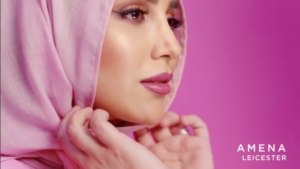It should come as no surprise to anyone that what you do and say on social media can come back to haunt you in a profound way. It’s an even bigger issue when your personal online history winds up affecting a global brand and causing an online backlash – as was the case this week with L’Oréal.
(Image retrieved from https://www.huffingtonpost.com/entry/loreal-amena-khan-hijab-tweets_us_5a6617cae4b0022830052a59)
L’Oréal initially earned favorable press with the landmark decision to include a hijab-wearing model and beauty blogger, Amena Khan, in its latest haircare campaign. Khan was the first woman in a hijab to star in a mainstream hair campaign (Abdelaziz, 2018; Kratofil, 2018), a decision that celebrated inclusivity and the countless women and girls who wear hijab. The ad included the sentiment that haircare is important to an individual, whether or not they display it (Jackson, 2018). This naturally caused excitement in the beauty world, since it highlighted a group of women not often reflected in current media and advertising.
Unfortunately, a series of Khan’s tweets from 2014 resurfaced online a few days later. The tweets, which had an anti-Israel slant, have now been deleted but are preserved via screenshot on numerous websites (Abdelaziz, 2018; Kratofil, 2018). Khan later declared her intention to step down from the L’Oréal campaign, issuing an apology via Instagram and reiterating her commitment to advocating for diversity (Kratofil, 2018). Her decision to withdraw from the ad campaign, as well as L’Oréal’s support of that decision, caused a mixed response online.
Regardless of your opinions on Israel, it’s worth considering whether backtracking on a historic ad campaign and spokesperson is the right decision. At first blush, the model’s political opinions don’t affect the overall message of the campaign – that beauty and taking care of yourself should be a decision made for you (Kratofil, 2018). Does the model’s personal opinion affect the product? It could, but on the other hand, dropping a diverse model from a significant campaign created to celebrate diversity may also end up in criticism. After all, L’Oréal was in the news just last year for dropping its first transgender model, activist Monroe Bergdorf, for a series of posts condemning white privilege in America (Workneh, 2017). Several people spoke out in Bergdorf’s favor, saying the comments were taken out of context and calling out L’Oréal for claiming to champion diversity while firing a black trans woman from a momentous campaign.
While L’Oréal certainly needs to keep its image in mind, it’s worth noting that by hiring nontraditional models and then promptly dropping them from campaigns for a variety of reasons, they may be damaging their reputation and alienating potential new client groups. What do you think? Should L’Oréal “walk the walk” and actively support diversity, or should they play it safe and steer clear of models who are politically engaged?
References
Abdelaziz, R. (2018, January 22). L’Oréal claims to champion diversity. But now its only Hijabi model is gone. Huffpost. Retrieved from https://www.huffingtonpost.com/entry/loreal-amena-khan-hijab-tweets_us_5a6617cae4b0022830052a59
Jackson, A. (2018, January 23). Hijab-wearing model pulls out of L’Oréal campaign over 2014 tweets. CNN. Retrieved from https://www.cnn.com/2018/01/23/world/amena-khan-loreal-hair-campaign-controversy/index.html
Kratofil, C. (2018, January 22). First hijab-wearing L’Oréal Paris hair model backs out of campaign after Twitter backlash. People. Retrieved from http://people.com/style/amena-khan-steps-down-from-loreal-hair-ads/
Workneh, L. (2017, September 1). L’Oréal fires its first trans model after she called out White America’s racism. Huffpost. Retrieved from https://www.huffingtonpost.com/entry/lor%C3%A9al-fires-its-first-trans-model-after-she-called-out-white-americas-racism_us_59a98190e4b0354e4409ec60


6 Responses to Social media faux pas: When your posts backfire on a global stage.